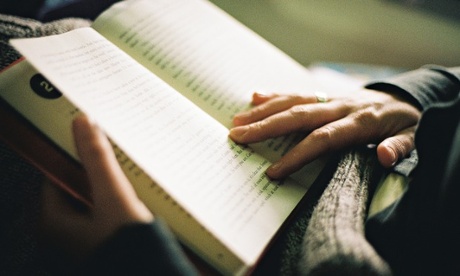
At this time of year, more than any other, books shamelessly flaunt the promise of happiness. Bookshop display tables are suddenly brimful of snappy new self-help and diet tomes dangling the carrot of contentment: buy me and you’ll get thin, rich, find yourself entirely decluttered, having better sex (or just some sex), doing well at work, nicotine-free, no longer dragged down by dysfunctional friends and family, or liberated from toxic habits that shiny, happy, successful people have long eschewed.
These are hollow promises, of course – if they worked, they wouldn’t appear again like a stubborn rash every single year – and buying one of these titles in gloomy old January will, I guarantee, be your most depressing book purchase of 2015. Far better to seek out books you know will actually make you happy. I’m spending this post-festive month, when both money and clothes are too tight to mention, re-reading some of my favourites, curled up on the sofa by the fire, in Christmas present slippers and PJs, with tea and crumpets to hand. It really is the best antidote to grim weather and short days, to spend time with old friends who will make you laugh and think, and transport you to more wondrous places than the gym.
This is what I’ll be reading; why not share your own recommendations in the comments below?
Good Behaviour by Molly Keane
This book still makes me ache with laughter and gasp at its barbed darkness: imagine Jane Austen, with an especially sharp, acerbic pencil, writing about unlikable privileged but fading Anglo-Irish families in the 1930s. It’s full of exquisite, peculiar details (it opens with a scene in which someone dies after eating rabbit mousse) and a focus on the psychological horror of growing up with parents who never take notice of you. This theme, in what is clearly a partly autobiographical novel, and the first Keane published under her own name rather than the androgynous alias MJ Farrell, mirrors her own experience. “They were utterly reclusive,” Keane said of her mother and father, and then they packed her off to boarding school. Of her time there, Keane said: “My unpopularity, that went to the edge of dislike, drove me into myself.” This novel, published in 1981 and shortlisted for the Booker, is the brilliant result of this insular, intense worldview. I have to re-read it every couple of years.
The Magic Toyshop by Angela Carter
Hard to choose just one Angela Carter novel: I could happily spend all month re-reading everything she wrote. But this was the first of hers that I read and I can still remember how it both rooted me to the spot – I read it in one go – and took me into the bonkers, dizzying world of her unique imagination. I admire some of the later novels, such as Nights at the Circus, more, but love this for its heightened style (Gothic fairytale meets crumbing south London) and feminist heroine, Melanie, who slightly soppily falls for her Heathcliffian cousin, Finn, but fights her tyrannical toymaker uncle and flees to a new life. It’s like a spectacularly weird, vivid dream when all the toys really have come to life and delicious mayhem ensues.
Finnegans Wake by James Joyce
Not a re-read as such, but a book to admire on the shelves and a spine to stroke. Just looking at this (see also Paradise Lost, War and Peace, Gravity’s Rainbow, Moby Dick) makes me immeasurably happy: I’ve read it and never, ever have to read it again. You will have your own ones in this category; go and smile at them.
Experience by Martin Amis
There is something especially admirable about being able to write an exceptional autobiography. Eva Hoffman’s Lost in Translation comes to mind as one of those very literary accounts whose prose you admire as much as the dramatic content, and the same is true of Amis’s: an exquisitely written memoir about middle age, dentistry and the murder of his cousin Lucy Partington, but also being a father, being a son, being a writer, and being an arse sometimes.
Explaining Magnetism by Maura Dooley
There’s so much about poetry to make you smile: you look cool reading it, the volumes tend to be on the slight side, and it’s so much more enriching as a puzzle than Sudoku. I’ve got a soft spot for Irish poetry, so anything by Yeats, Seamus Heaney, Paul Muldoon or Eavan Boland will make me happy pretty swiftly. But my favourite Irish-ish collection is Explaining Magnetism by Maura Dooley, and especially the poem Second Generation. I like poems to take me off into new realms or to conjure new thoughts on the universal issues, but Dooley’s verse speaks to me as no other about being second-generation Irish and the particular emotional disjuncture that goes with it. “My dreams are hedged with red and purple,” she writes, “seal-lined, damp under blue mountains, caught like a burr/on this country’s old coat that I try to shrug around me.”
The Accursed by Joyce Carol Oates
My favourite and most expensive read of 2014. I got so engrossed in this postmodern and often very funny Gothic tale of a curse taking over Princeton in 1905/6 that I missed my stop on a train connecting to a flight and missed the plane. Oates has written at least a novel a year for 50 years, and few of them are slim volumes. My favourites, which would also include Dark Water and the breathtakingly ambitious Blonde, emphatically absorb you as you read them: nothing else exists, and that’s a very good feeling every now and then.
What books make you happiest? Share your favourites in the comments below

